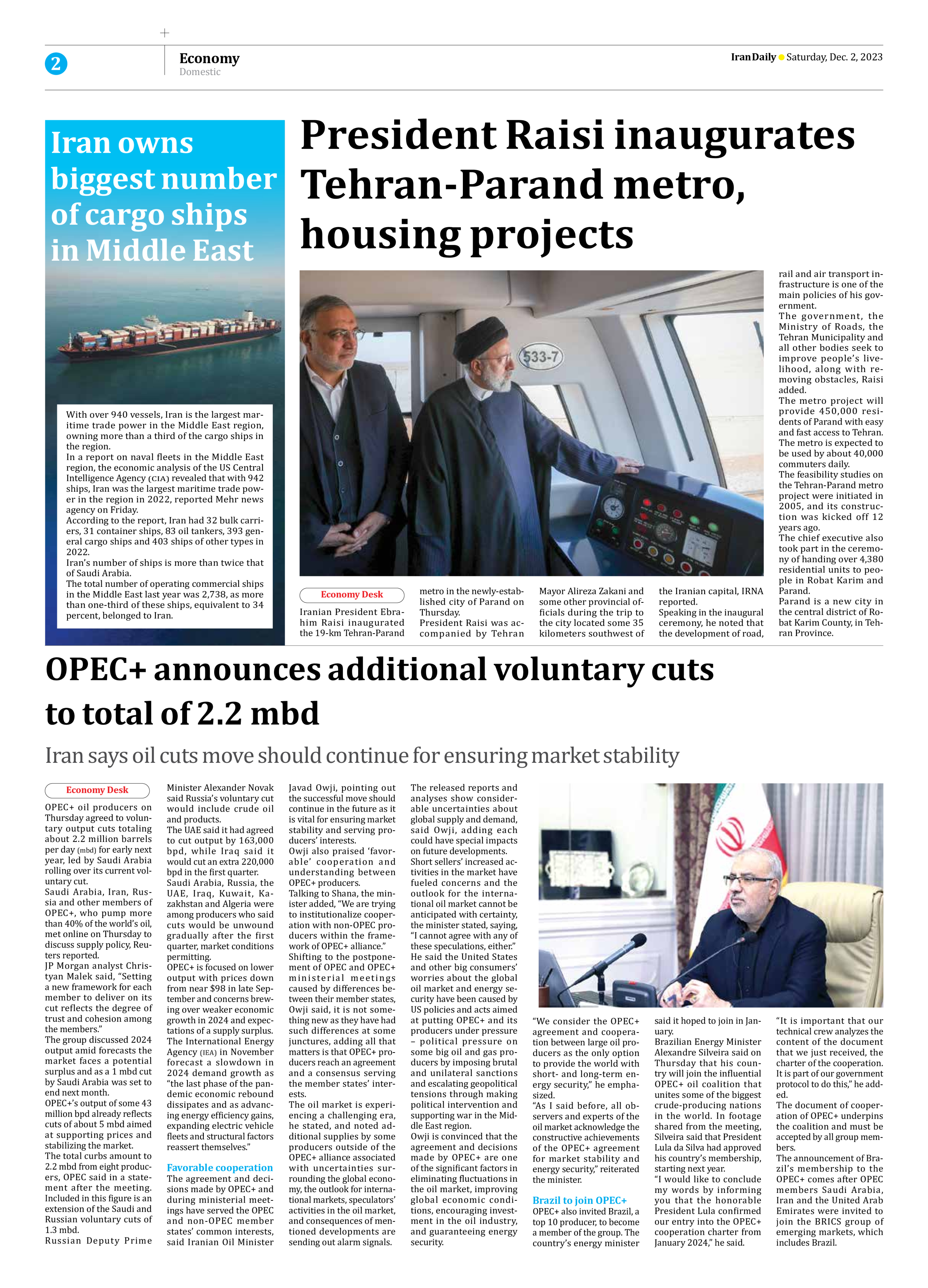
OPEC+ announces additional voluntary cuts to total of 2.2 mbd
Iran says oil cuts move should continue for ensuring market stability
OPEC+ oil producers on Thursday agreed to voluntary output cuts totaling about 2.2 million barrels per day (mbd) for early next year, led by Saudi Arabia rolling over its current voluntary cut.
Saudi Arabia, Iran, Russia and other members of OPEC+, who pump more than 40% of the world’s oil, met online on Thursday to discuss supply policy, Reuters reported.
JP Morgan analyst Christyan Malek said, “Setting a new framework for each member to deliver on its cut reflects the degree of trust and cohesion among the members.”
The group discussed 2024 output amid forecasts the market faces a potential surplus and as a 1 mbd cut by Saudi Arabia was set to end next month.
OPEC+’s output of some 43 million bpd already reflects cuts of about 5 mbd aimed at supporting prices and stabilizing the market.
The total curbs amount to 2.2 mbd from eight producers, OPEC said in a statement after the meeting. Included in this figure is an extension of the Saudi and Russian voluntary cuts of 1.3 mbd.
Russian Deputy Prime Minister Alexander Novak said Russia’s voluntary cut would include crude oil and products.
The UAE said it had agreed to cut output by 163,000 bpd, while Iraq said it would cut an extra 220,000 bpd in the first quarter.
Saudi Arabia, Russia, the UAE, Iraq, Kuwait, Kazakhstan and Algeria were among producers who said cuts would be unwound gradually after the first quarter, market conditions permitting.
OPEC+ is focused on lower output with prices down from near $98 in late September and concerns brewing over weaker economic growth in 2024 and expectations of a supply surplus.
The International Energy Agency (IEA) in November forecast a slowdown in 2024 demand growth as “the last phase of the pandemic economic rebound dissipates and as advancing energy efficiency gains, expanding electric vehicle fleets and structural factors reassert themselves.”
Favorable cooperation
The agreement and decisions made by OPEC+ and during ministerial meetings have served the OPEC and non-OPEC member states’ common interests, said Iranian Oil Minister Javad Owji, pointing out the successful move should continue in the future as it is vital for ensuring market stability and serving producers’ interests.
Owji also praised ‘favorable’ cooperation and understanding between OPEC+ producers.
Talking to Shana, the minister added, “We are trying to institutionalize cooperation with non-OPEC producers within the framework of OPEC+ alliance.”
Shifting to the postponement of OPEC and OPEC+ ministerial meetings caused by differences between their member states, Owji said, it is not something new as they have had such differences at some junctures, adding all that matters is that OPEC+ producers reach an agreement and a consensus serving the member states’ interests.
The oil market is experiencing a challenging era, he stated, and noted additional supplies by some producers outside of the OPEC+ alliance associated with uncertainties surrounding the global economy, the outlook for international markets, speculators’ activities in the oil market, and consequences of mentioned developments are sending out alarm signals.
The released reports and analyses show considerable uncertainties about global supply and demand, said Owji, adding each could have special impacts on future developments.
Short sellers’ increased activities in the market have fueled concerns and the outlook for the international oil market cannot be anticipated with certainty, the minister stated, saying, “I cannot agree with any of these speculations, either.”
He said the United States and other big consumers’ worries about the global oil market and energy security have been caused by US policies and acts aimed at putting OPEC+ and its producers under pressure – political pressure on some big oil and gas producers by imposing brutal and unilateral sanctions and escalating geopolitical tensions through making political intervention and supporting war in the Middle East region.
Owji is convinced that the agreement and decisions made by OPEC+ are one of the significant factors in eliminating fluctuations in the oil market, improving global economic conditions, encouraging investment in the oil industry, and guaranteeing energy security.
“We consider the OPEC+ agreement and cooperation between large oil producers as the only option to provide the world with short- and long-term energy security,” he emphasized.
“As I said before, all observers and experts of the oil market acknowledge the constructive achievements of the OPEC+ agreement for market stability and energy security,” reiterated the minister.
Brazil to join OPEC+
OPEC+ also invited Brazil, a top 10 producer, to become a member of the group. The country’s energy minister said it hoped to join in January.
Brazilian Energy Minister Alexandre Silveira said on Thursday that his country will join the influential OPEC+ oil coalition that unites some of the biggest crude-producing nations in the world. In footage shared from the meeting, Silveira said that President Lula da Silva had approved his country’s membership, starting next year.
“I would like to conclude my words by informing you that the honorable President Lula confirmed our entry into the OPEC+ cooperation charter from January 2024,” he said.
“It is important that our technical crew analyzes the content of the document that we just received, the charter of the cooperation. It is part of our government protocol to do this,” he added.
The document of cooperation of OPEC+ underpins the coalition and must be accepted by all group members.
The announcement of Brazil’s membership to the OPEC+ comes after OPEC members Saudi Arabia, Iran and the United Arab Emirates were invited to join the BRICS group of emerging markets, which includes Brazil.







